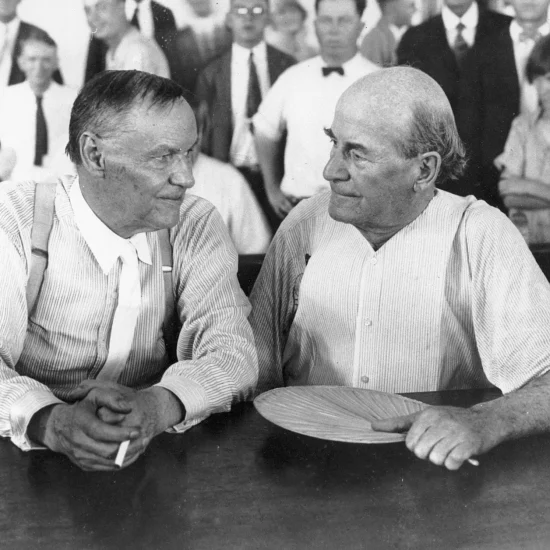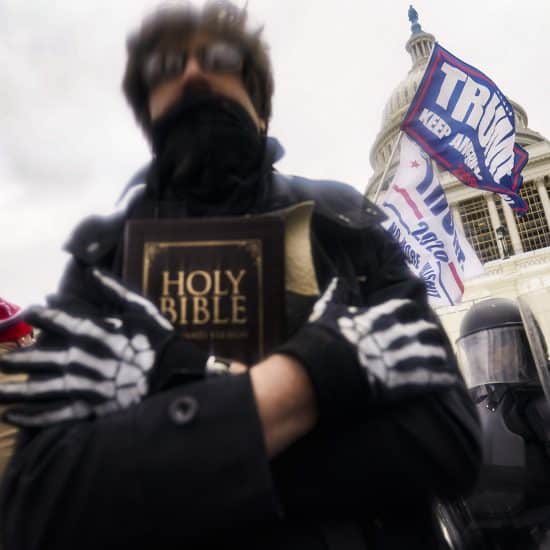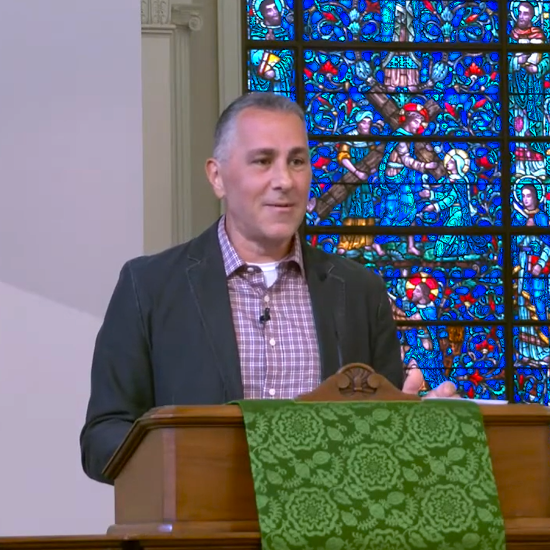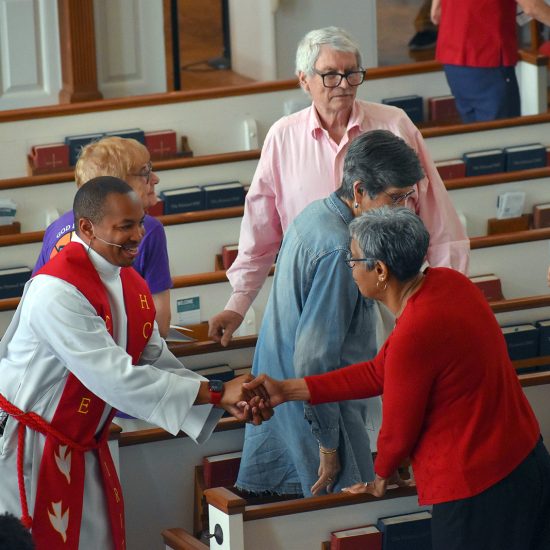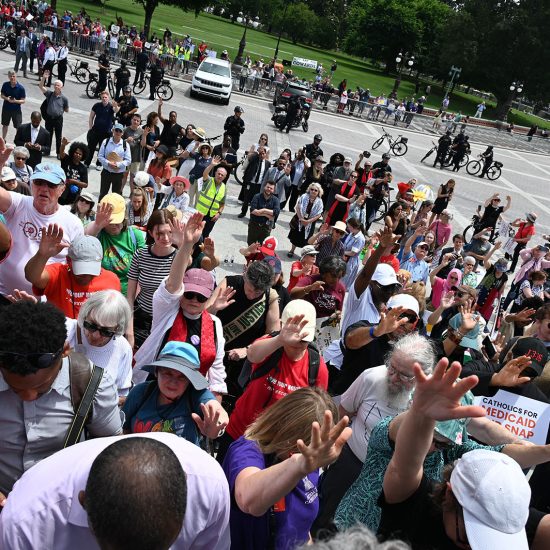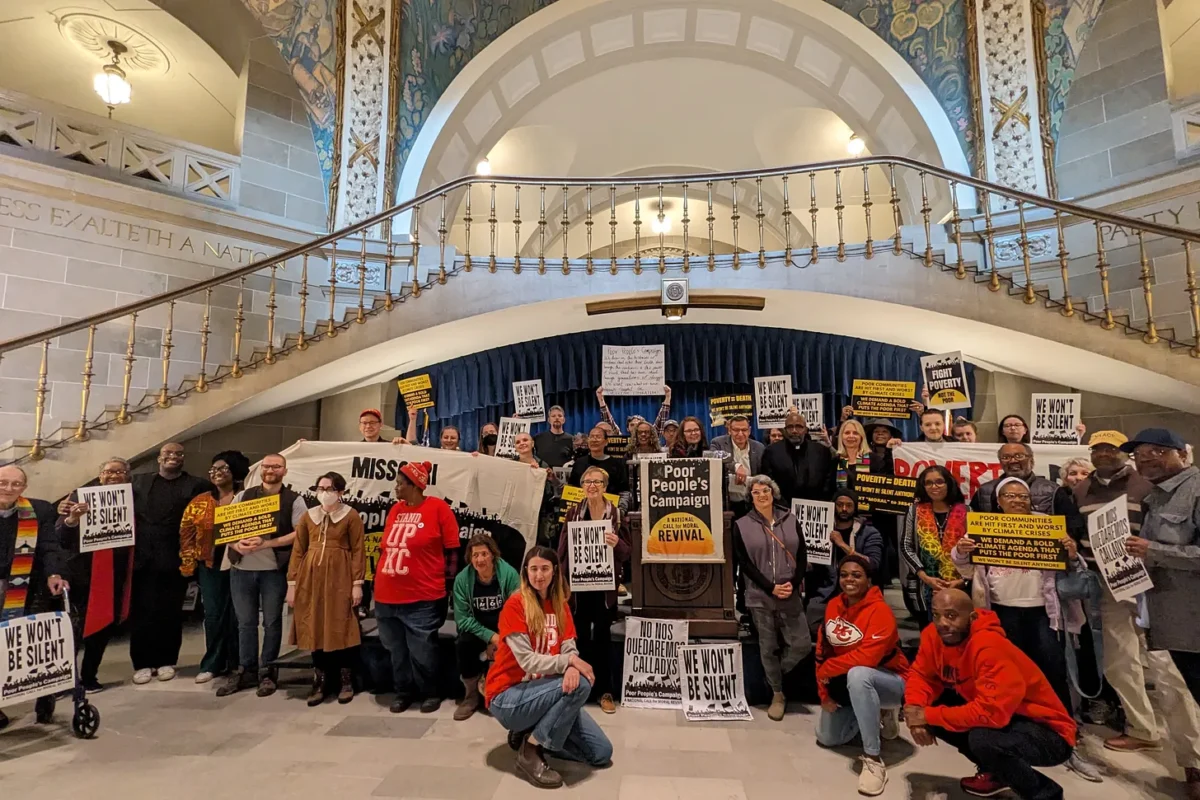
On Saturday (March 2), Republicans in Missouri gathered in school gymnasiums, county courthouses, and churches for presidential caucus meetings to vote for their preferred candidate. But while Donald Trump swept the votes and took all of the state’s delegates, some Missourians instead gathered at a church in downtown Jefferson City before marching to the state Capitol to demand legislation addressing poverty.
“Poverty equals death,” declared Rabbi Doug Albert of Congregation Kol Ami in Kansas City. “It is the fourth-leading cause of death in the country. Eight hundred people die each day due to poverty. It is inexcusable and we won’t stand for it anymore.”
The event in the Show-Me State was actually one of 32 rallies in state capitals on Saturday as part of the Poor People’s Campaign led nationally by Bishop William Barber II and Rev. Liz Theoharis. The PPC’s advocacy events pushed for policies to reduce poverty like a living wage, affordable housing, healthcare, and environmental justice. The new PPC launched in 2018 to mark the 50th anniversary of the 1968 Poor People’s Campaign, a march that Rev. Martin Luther King Jr. was organizing at the time of his assassination to push for economic justice.
“People ought to come to Washington, sit down if necessary in the middle of the street and say, ‘We are here; we are poor; we don’t have any money; you have made us this way … and we’ve come to stay until you do something about it,’” King declared.
In that spirit, Barber, Theoharis, and others have been organizing events in state capitols and in Washington, D.C., over the past several years to, as some of their banners put it, “fight poverty not the poor.” The nonviolent protests and rallies are continuing this year with the events over the weekend and a gathering in D.C. in June
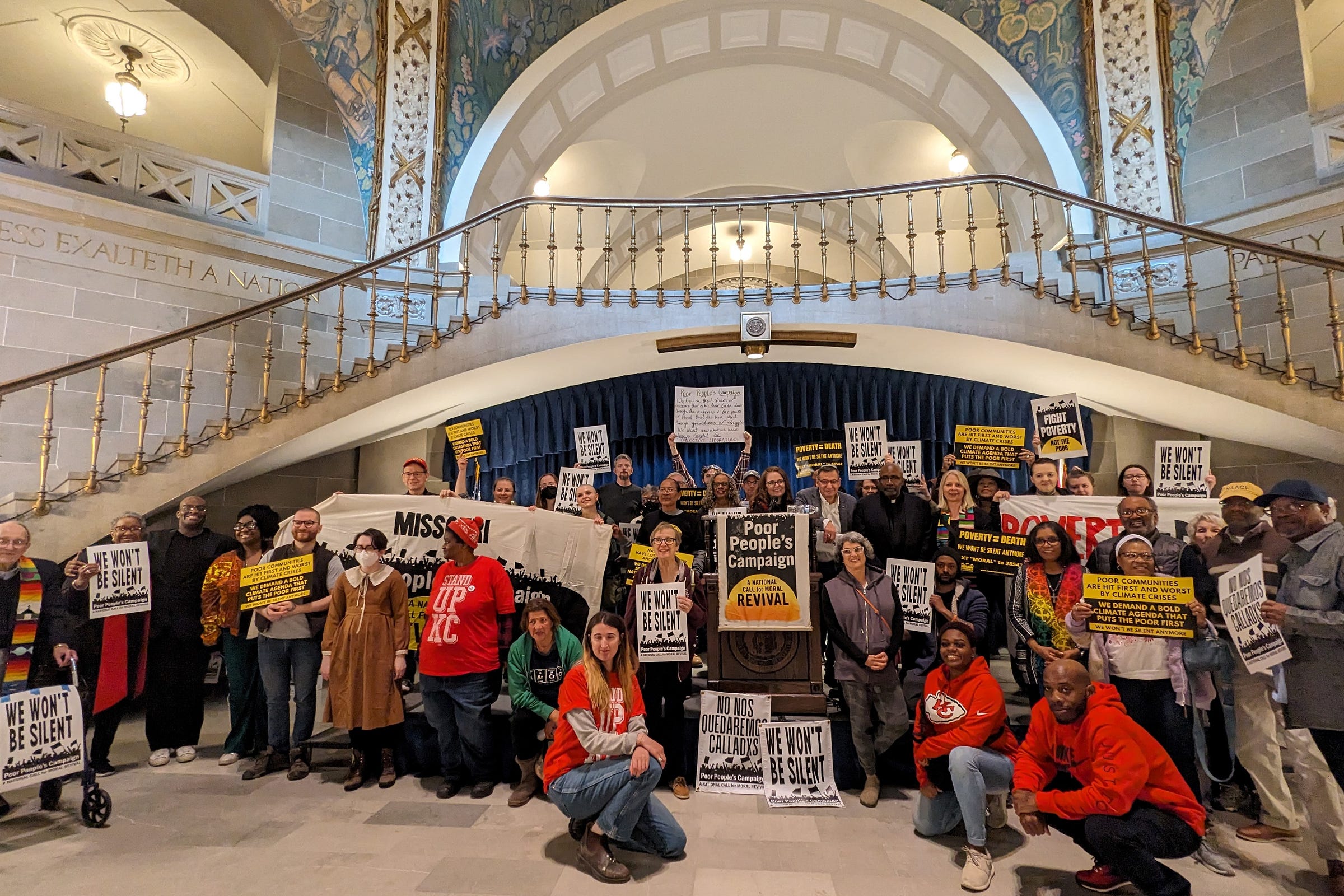
Supporters gather for a Poor People’s Campaign rally inside the Missouri Capitol in Jefferson City on March 2, 2024. (Brian Kaylor/Word&Way)
The effort this year includes encouraging people to vote and protect the voting rights of those targeted for disenfranchisement in many states. As Albert, a tri-chair of the PPC in Missouri, explained during Saturday’s assembly, the goal of the movement is to lift up the voices of those not addressed by political leaders.
“The motto of the state is ‘let the good of the people be the supreme law.’ This is supposed to be the people’s house, they’re supposed to be working for us. It has not been the people’s house. But it’s going to be the people’s house,” he added. “It’s going to be the poor people’s house.”
As his voice echoed inside the rotunda, similar calls went out across the country, from Florida to Washington, Arizona to Maine, Texas to Wisconsin. And in a season of Christian Nationalism where some seek political power for just one sliver of the populace, the Poor People’s Campaign offers an alternative model of Christians engaging in political advocacy in ways that don’t threaten to dismantle our pluralistic democracy. So this issue of A Public Witness takes you inside the Poor People’s Campaign and its recent rallies hoping to put issues of poverty on the public agenda in this election year.
‘Things Have to Change’
At the Missouri Poor People’s Campaign event, attendees started at a downtown Disciples of Christ church and marched a couple of blocks to the Capitol. As they carried signs and a coffin with a message about 800 people dying each day from poverty, they passed by the Governor’s Mansion.
The day before, Gov. Mike Parson commuted the sentence of Britt Reid, a former assistant coach with the Kansas City Chiefs (and son of head coach Andy Reid) who had been sentenced to three years in prison for a drunk driving incident that put a five-year-old girl in a coma for 11 days and left her with a permanent limp and other lasting health issues. After Reid spent only about half of his sentence, Parson commuted it to house arrest. The governor, a Southern Baptist with a Chiefs tattoo and season tickets, in the past refused to pardon Black men wrongly convicted and who thus had to spend months longer in prison before getting released by court rulings.
Another block later, the marchers filed into the Capitol to decry a government that prioritizes wealthy, White men over other citizens.
“Things have to change,” declared Missouri PPC Tri-Chair Rev. Mindy Fugarino, senior pastor at Independence Boulevard Christian Church in Kansas City. “Our state assemblies, our state legislators, and governors, they make decisions that impact poor and low-wage people every day. They impact minimum wage, they impact health care, public education, housing, women’s rights, and voting rights.”
“We’re challenging that 800 people die every day because of poverty. And that is a moral, economic, and social crisis. We can abolish that. We need to abolish that,” she added. “Poverty and low wages — those are choices, choices of the leadership in our government. They’re bad political choices. And we cannot be disengaged anymore from the political process because we need those choices to change.”
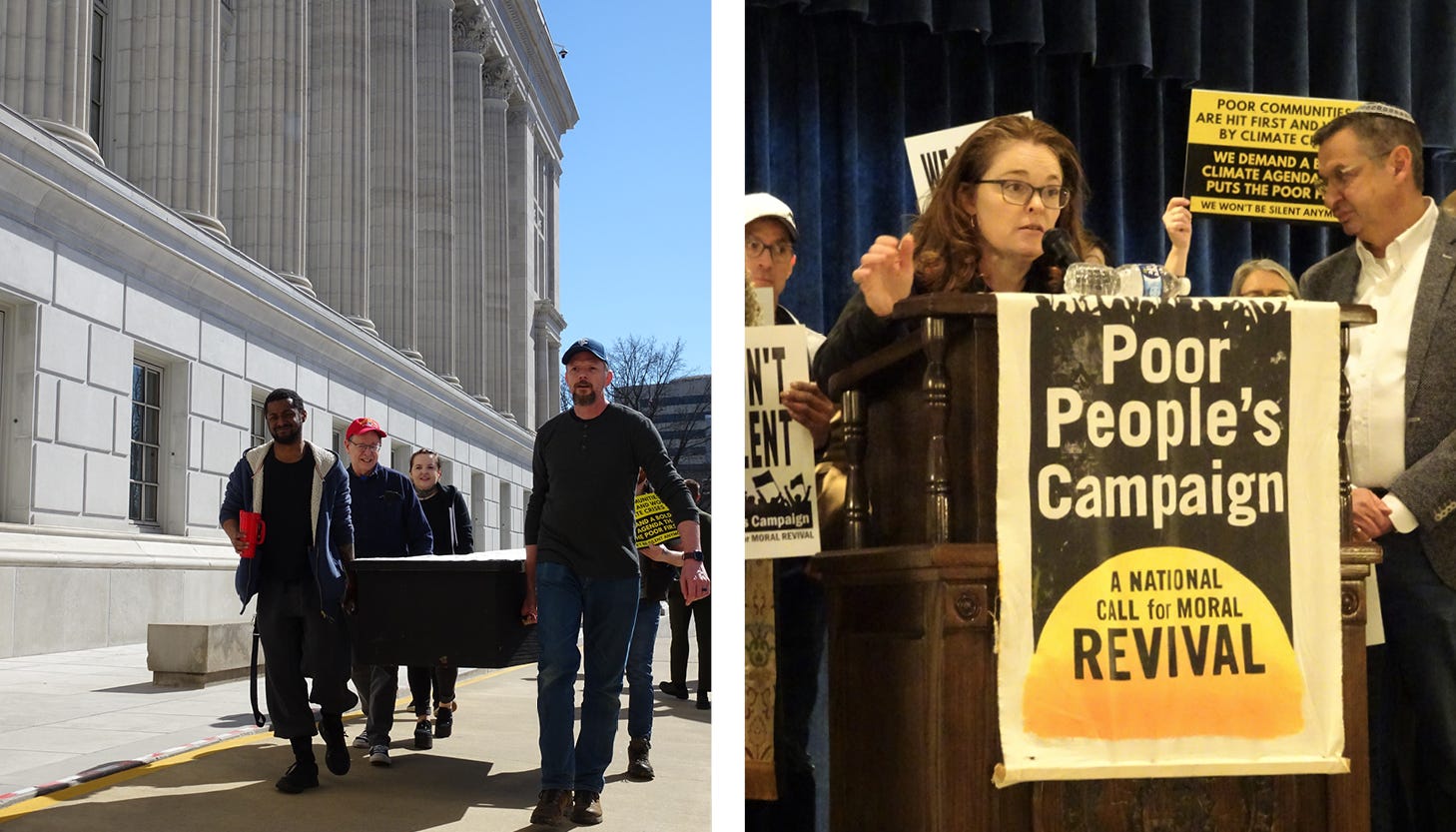
Left: Marchers carry a coffin outside the Missouri Capitol during a Poor People’s event in Jefferson City on March 2, 2024. Right: Rev. Mindy Fugarino speaks at the rally inside the Capitol. (Brian Kaylor/Word&Way)
Similar messages were heard at other PPC events on Saturday as various speakers decried political priorities that ignore the plight of people struggling to make ends meet. At several locations, marchers carried a coffin to represent those dying each day from poverty.
“The most important thing here today is that we talk about policy murder. People are dying because they’re poor and that needs to be addressed,” Michael Bagdes-Canning, an environmental activist and retired teacher, said at the PPC rally in Harrisburg that moved because of rain from outside the Capitol to inside a nearby United Methodist church.
“The wealthiest country on earth, the United States of America, has also the largest percentage of poverty of any developed nation in the world,” said Rev. Lyle Dykstra, a retired Presbyterian Church (U.S.A.) minister, ahead of the PPC rally in Dover, Delaware. “This is clearly a moral issue, our people are dying. … They are dying because they are not able to earn a decent living.”
“When people die, you may see all kinds of things listed on their death certificate, but if you dig a little deeper you might find out that they died really because of poverty-related issues,” Alabama PPC Tri-Chair Rev. Carolyn Foster, deacon at St. Mark’s Episcopal Church in Birmingham, argued on the steps of the state Capitol in Montgomery. “Lack of Medicaid expansion, not having a living wage and couldn’t find work, or lack of affordable housing.”
In addition to naming the societal failures and public policy decisions resulting in more poverty, PPC rally speakers also talked about the importance of mobilizing voters to make a difference in political priorities at statehouses across the country. As Missouri PPC Tri-Chair Rev. Rodney Williams, pastor of Swope Parkway United Christian Church in Kansas City, put it, they were gathering “to mobilize poor and low-wage voters, to wake up the sleeping giant.”
“We will vote our demands at the ballot box. We know the power statehouses have to impact policy,” he added. “We are inviting each and every one of you to be a part of this moral fusion demonstration and movement.”
In other states, the push for mobilizing voters — and the fight against voter suppression efforts — was also a key theme. Such as in Nebraska where Lanae Hall, a therapist and the state’s PPC coordinator, said at the Capitol in Lincoln that “there are a lot of folks that are struggling,” but the PPC is “a way for them to get involved and bring their voice and their power to bear.”
“So many times we see that people are suffering,” Brenda Ellis, a PPC rally organizer in South Carolina, said on the steps of the statehouse. “The Poor People’s Campaign makes sure that we get out and we have a voice for those people who don’t have a voice, so we were out here singing, we’re out here marching, and we’re out here doing what we can to lift those people up who are poor and low-wage people out here that are suffering.”
“It’s time that we have to advocate,” Nyeka Arnold, a community health worker, declared on the steps of the Texas Capitol. “We have to show up and speak up.”
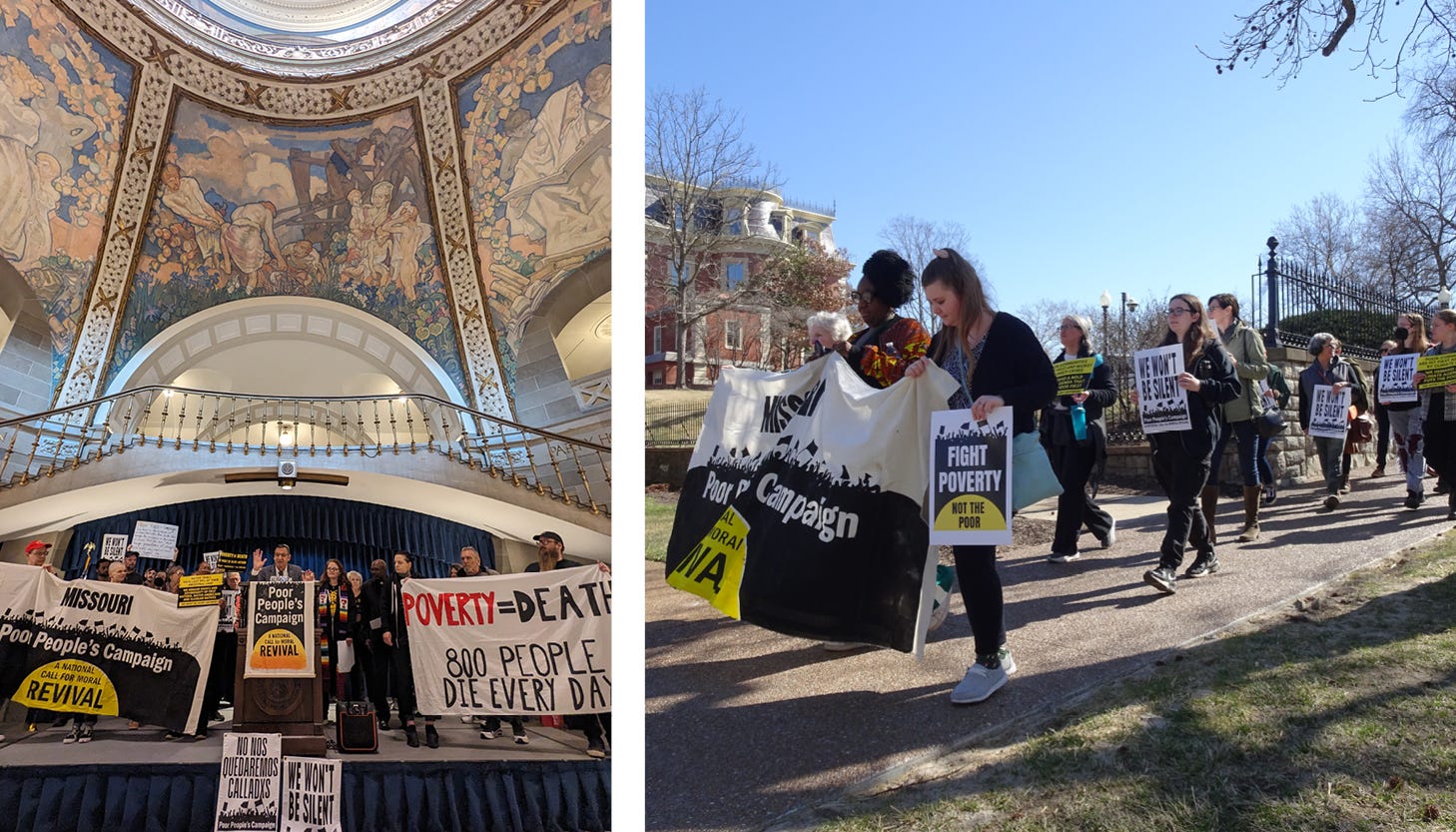
Left: Rabbi Doug Albert speaks during a Poor People’s event inside the Missouri Capitol in Jefferson City on March 2, 2024. Right: Marchers hold signs while passing the Governor’s Mansion on the way to the Capitol. (Brian Kaylor/Word&Way)
Resurrection, Not Insurrection
In this polarized election year in the shadow of a Christian Nationalistic-fueled attack on the U.S. Capitol, clergy speaking during marches at state capitols might raise concerns. But the Poor’s People Campaign is modeling something different.
“This is not an insurrection of hate and destruction. Let’s be very, very clear about that. We are a resurrection of power and purpose,” Rev. Mindy Fugarino declared during Missouri’s rally. “We are challenging extremism that has been ruling for too long in state governments.”
The use of the word “resurrection” by the Poor People’s Campaign goes back to King’s original effort in 1968. After his assassination, Rev. Ralph Abernathy and the Southern Christian Leadership Conference moved ahead with the protest that saw up to 3,000 people camping on the National Mall for up to six weeks. Caravans of poor people descended on the nation’s capital and set up in tents in a camp they named “Resurrection City.” After the assassination of Robert F. Kennedy, his funeral procession passed through Resurrection City on the way to Arlington National Cemetery.
After the permit for the camp ended, police forcibly removed the remaining residents, arresting Abernathy and more than 280 other people. Ultimately, the effort fizzled — with King’s assassination likely hurting the project before it even started. But the project did spark a few minor policy changes. And it lived on in the imagination of activists until the Poor People’s Campaign was resurrected six years ago. Like King’s movement, it represents an approach to public advocacy that’s quite a contrast to the insurrection three years ago.
Not all faith-based advocacy by Christians is Christian Nationalism. The PPC movement demonstrates this by developing broad-based coalitions crossing racial and faith lines. Additionally, the goal of the movement isn’t to horde power and carve out special privileges just for a narrow slice of the populace. Instead, the movement challenges the exclusionary power of White Christian Nationalism.
“I believe in the coalitions built by the Poor People’s Campaign. I believe in a multi-race coalition. I believe in a multi-faith coalition. In a coalition of rural, urban, and suburban. A coalition of straight and queer. This is where we all need to be,” Rabbi Doug Albert explained in Missouri’s Capitol on Saturday. “This is where we all need to be. We need each other. We all need to be working together for a more just world and for justice for the poor people in our country.”
As a public witness,
Brian Kaylor

